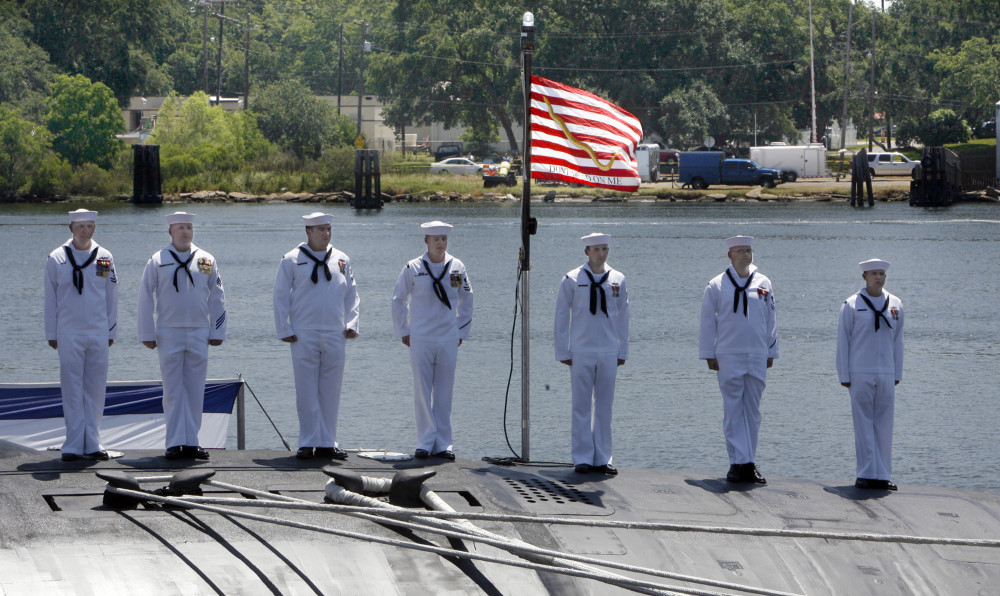By Gordon Jackson
The Brunswick News, Ga.
ST. MARYS
Enlisted women could begin serving aboard submarines as early as 2016, depending on the interest female sailors have in serving on the boats.
Every enlisted woman in the Navy will be asked to participate in an anonymous survey this summer to determine how many would volunteer to serve aboard the vessels.
“The ability to attract, recruit and retain quality female sailors is essential to the success of integration. It will also be a big challenge,” Lt. Timothy Hawkins, spokesman for the task force, said in a statement.
Former national Navy League president Sheila McNeill, who now serves as president of Camden Partnership, says she isn’t surprised at the announcement, because of how well female officers have performed aboard submarines since the Navy lifted the ban in 2010.
“It certainly has been a success so far,” McNeill said. “There haven’t been any issues.”
Retired Navy Master Chief Royal Weaver of St. Marys says the integration of enlisted men and women as sailors will be done most easily on Ohio-class submarines, such as those ported at Naval Submarine Base Kings Bay, because they are the largest submarines in the Navy.
Kings Bay has eight Ohio-class submarines and a base at Bangor, Wash., has 10 of the boats. The boats are 570 feet long, with a crew of about 150.
Women are also expected to serve on the 55 fast-attack submarines, which are half the size of the Ohio-class and have nearly the same number of sailors.
To make it work on Ohio-class boats, Weaver says it is likely the sailors’ lounge, where they watch movies and play games, would be converted into a women’s bathroom and shower. Cubicles nearby could be designated as women’s quarters.
“Every time the Navy changes, there are sacrifices,” Weaver said. “I think there will be growing pains.”
Sailors aboard the submarines will have to do what they do on smaller fast-attack submarines, which is use the mess deck as a sailors’ lounge when meals are not being served.
“It provides one less area where they do training or watch movies,” Weaver said.
The close quarters where sailors are constantly bumping into each other — especially aboard fast-attack subs — could lead to sexual harassment accusations, even if there is no intent, he said.
Another challenge is where female chiefs would be berthed, since the quarters for those serving in the rank are already small.
Weaver says it’s most likely that female chiefs would share the same living quarters as other enlisted women.
“It’s still going to be tough,” he said. “It will be a challenge, depending on how many women you have.”
But Weaver says he doesn’t think the living quarters will be an issue because some chiefs and officers on fast-attack subs are berthed with enlisted crew members.
The issue with female chiefs will likely be when they go on their first couple of deployments with no experience serving aboard a submarine and give orders to more experienced sailors, Weaver said.
“It’s going to be the knowledge issue that will create problems,” he said.
In the lower ranks, the concern will be inappropriate relationships between younger male and female sailors. Weaver says sailors with higher ranks will have to closely monitor how the younger men and women interact to make sure they don’t have inappropriate relationships.
buy forzest online nouvita.co.uk/wp-content/themes/twentynineteen/fonts/en/forzest.html no prescription
Once the survey results come in, a task force will determine specifics about integrating women into the crews. They are expected to make a decision by early 2015.
McNeill says she believes it’s important to allow women to serve aboard submarines because it gives the Navy the ability to allow the most talented, intelligent women to serve aboard the vessels if they choose.
“I think the Navy has enough sense to take it easy,” McNeill said of allowing women to serve aboard the boats. “I have a feeling they are going to work it out.”














































































































































































































































































































































































